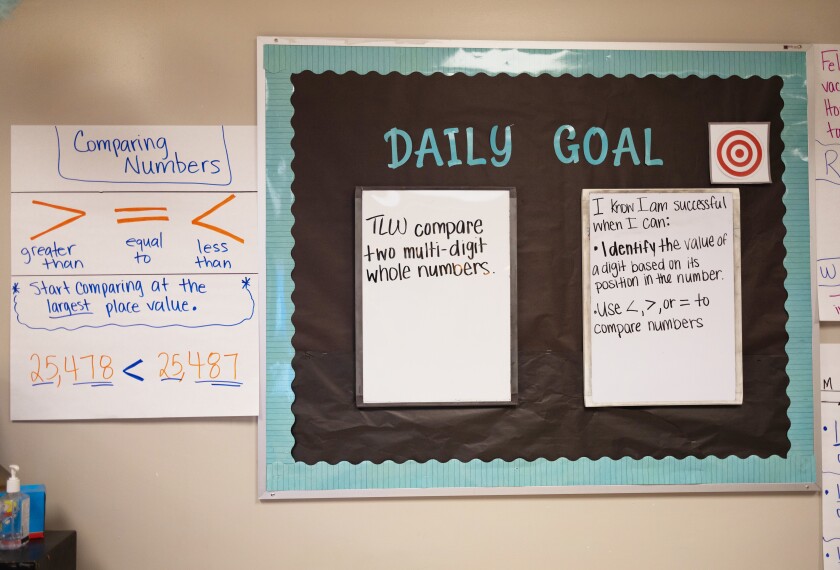A consensus is growing among members of Congress, educators, and corporate leaders in favor of a stronger federal effort to bolster mathematics and science education from the earliest grades through college.
Some of the ideas under discussion on Capitol Hill include improving teacher preparation, promoting effective instructional strategies, and increasing financial aid to encourage promising students to become math and science teachers.
Business leaders and lawmakers from both parties have called on President Bush in recent weeks to pledge stronger federal support for mathematics and science education in his State of the Union Address, scheduled for Jan. 31. Congress is also moving on the issue, by introducing several bills to upgrade K-12 science and math instruction.

Business leaders and federal officials are driven by oft-cited worries about the United States’ future economic standing. The ability of nations such as China and India, in particular, to use an increasingly skilled, relatively low-paid workforce to lure jobs away from the United States—and churn out students with superior skills in science and engineering fields—has major economic implications here, they say.
The recent focus on the issue is “a confluence of a large number of things,” said Norman R. Augustine, the retired chairman and chief executive of the aerospace and technology giant Lockheed Martin Corp. “The public pays attention when mixed groups come together and say, ‘We can agree on this.’ ”
Mr. Augustine chaired a committee made up of corporate, higher education, and science leaders that in October produced a report that made 10 recommendations to federal lawmakers for strengthening science and technology innovation. The report, “Rising Above the Gathering Storm: Energizing and Employing America for a Brighter Economic Future,” was published by the National Academies, an independent research entity chartered by Congress.
The report’s suggestions include recruiting 10,000 new math and science teachers annually, luring them with four-year college scholarships if they agree to teach five years in K-12 public schools. It also recommends vastly increasing professional-development programs for math and science teachers, offering incentives for students to take advanced courses, and encouraging the development of a rigorous, but voluntary, national curriculum. (“Panel Urges U.S. Push to Raise Math, Science Achievement,” Oct. 19, 2005.)
Master Teachers
A bill sponsored by Rep. Bart Gordon, D-Tenn., the ranking minority member of the House Science Committee, cites the report and seeks to implement several of its recommendations, including expanding federal funding for the professional development of math and science instructors and cultivating master teachers to mentor their peers in those subjects.
Last week, several members of the Senate, including Sens. Lamar Alexander, R-Tenn., and Jeff Bingaman, D-N.M.—who commissioned the National Academies’ report—said they would introduce legislation crafted largely on the “Gathering Storm” conclusions.
In addition, the Senate in December approved a bill that would authorize a five-year, $3.75 billion program to give students from low-income households as much as $4,000 in federal college aid if they major in mathematics, science, technology, engineering, or foreign languages. The measure awaits action in the House.
Boost From Business?
Math and science organizations have been advocating stronger teacher training for years, noted Jodi Peterson, the legislative director of the National Science Teachers Association, in Arlington, Va. But that message carries more power, she said, when delivered by the business community.
“They’ve been the drivers of a lot of this work,” Ms. Peterson said.
General concerns about the quality of math and science education have more recently “morphed into a discussion of more and better jobs, ” Rep. Gordon said in an interview explaining the legislation he introduced. “That’s a stronger universal message.”

Other observers, however, caution against overstating the crisis in math and science education.
Vivek Wadhwa is the co-author of a Duke University study that says U.S. executives are scaring students away from math and science careers because of their gloom-and-doom scenarios in which many American jobs will be outsourced to foreign workers. China and India, two countries often cited as producing tens of thousands of engineers, include less-highly-trained workers in their own counts than the United States does, Mr. Wadhwa said. (“Study: U.S.-Asian Engineering Gap Overstated,” Jan. 4, 2006.)
Still, Mr. Wadhwa, an adjunct professor at Duke’s school of engineering, agreed that the United States needs to improve its pre-collegiate education system so that more of its top math and science students are homegrown.
“If you look at the enrollment [of engineering schools], they’re increasingly dependent on foreign students,” he said in an interview.
Mr. Augustine, the former Lockheed Martin chief, and others acknowledge that hurdles in implementing major nationwide changes to math and science instruction must still be overcome. His panel’s suggestions carry an estimated annual price tag of $10 billion. Moreover, Mr. Augustine said, there has not yet been a “Sputnik moment”—a single galvanizing event that illustrates what the lack of math and science preparedness in the country could mean to average citizens. The launch of that satellite by the Soviet Union in 1957 led to a major campaign to boost education in the United States.
“There’s been no wake-up call,” Mr. Augustine said.
White House View
The White House isn’t saying whether President Bush will address math and science in his State of the Union Address.
But White House Chief of Staff Andrew H. Card Jr., in a Jan. 11 speech before the U.S. Chamber of Commerce, cited the “Gathering Storm” report in detail, calling its findings “dramatic.” He acknowledged, however, that budget decisions would also be a factor as the administration weighed its recommendations. The president’s fiscal 2007 federal budget request is expected to be released soon after the State of the Union speech.
“On the physical-sciences side, there is a dearth of students, and there is a dearth of teachers,” Mr. Card told the business audience, “and there is a dearth of scholarships and opportunities at some of our major institutions.”






